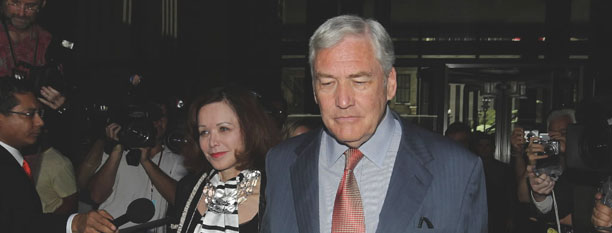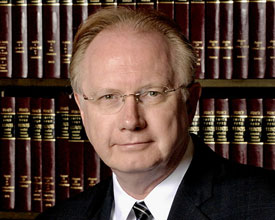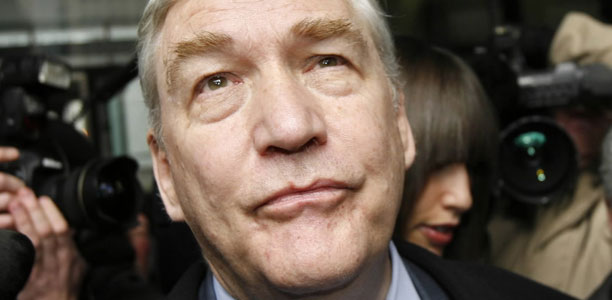March 28 at 6:06 a.m.
Filed under:
Litigation,
Retail,
Work culture
From the New York Times | When the Supreme Court considers on Tuesday whether hundreds of thousands of women can band together in an employment discrimination suit against Wal-Mart, the argument may hinge on the validity of the hotly disputed conclusions of a Chicago sociologist.
Plaintiffs in the class-action suit, who claim that Wal-Mart owes billions of dollars to as many as 1.5 million women who they say were unfairly treated on pay and promotions, enlisted the support of William T. Bielby, an academic specializing in “social framework analysis.” Get the full story>>
Jan. 24 at 10:35 a.m.
Filed under:
Government,
Jobs/employment,
Litigation
By Reuters
The Supreme Court ruled Monday that a federal law barring retaliation against a worker for complaints about on-the-job discrimination also protected the employee’s relative from unlawful dismissal.
The high court unanimously ruled for Eric Thompson, who was fired from his job at a stainless steel manufacturing plant in Kentucky after his fiancee, who also worked there, filed a discrimination complaint. Get the full story »
Jan. 19 at 2:44 p.m.
Filed under:
Litigation,
Work culture
By CNN
The Supreme Court has again rejected broad privacy rights for some government workers.
A unanimous bench on Wednesday affirmed the government’s right to conduct personal background checks on current and prospective employees under federal contract, especially those in sensitive or high-security workplaces. Get the full story »
Jan. 7 at 2:26 p.m.
Filed under:
Litigation,
Pharmaceuticals,
Technology
By Reuters
The U.S. Supreme Court said Friday that it would decide whether a state law restricting commercial access to information about prescription drug records violated constitutional free-speech rights. Get the full story »
Nov. 2, 2010 at 1:10 p.m.
Filed under:
Entertainment,
Regulations,
Video
By Associated Press
The Supreme Court on Tuesday expressed sympathy for a California law that aims to keep children from buying ultraviolent video games in which players maim, kill or sexually assault images of people.
But several justices said the law faces a high constitutional hurdle before going into effect. Get the full story »
Sep. 29, 2010 at 2:24 p.m.
Filed under:
Litigation,
Media

Conrad Black and wife Barbara Amiel in July of 2010, leaving the Dirksen U.S. Courthouse in Chicago. (Terrence Antonio James/Chicago Tribune/MCT)
Bloomberg News | Conrad Black’s 2007 convictions for fraud and obstructing justice should be thrown out because it’s impossible to tell whether jurors found him guilty under a now-invalid legal theory, his lawyer told a federal appeals court.
A three-judge panel in Chicago is hearing Black’s case today for the second time following a U.S. Supreme Court decision that narrowed the scope of the so-called honest services fraud statute, the law used to prosecute the former Hollinger International Inc. chairman.
“None of the fraud or obstruction convictions can survive examination of the trial record,” Black’s appellate lawyer, Miguel Estrada, told the judges during oral arguments. Prosecutors, in court filings, said there’s ample evidence to support Black’s conviction on other grounds. Get the full story »
Aug. 27, 2010 at 4:21 p.m.
Filed under:
Bank failures,
Banking,
Economy,
Investing,
Policy
By Reuters
A U.S. appeals court granted the Federal Reserve a 60-day delay in implementing a ruling to force the central bank to reveal details of its emergency lending programs to banks during the financial crisis. Get the full story »
Aug. 23, 2010 at 1:50 p.m.
Filed under:
Litigation,
Politics
By Ameet Sachdev

Justice Thomas L. Kilbride in 2007. (Photo from Illinois Supreme Court)
Judicial retention races are usually about as exciting as renewing your driver’s license.
Usually Illinois judges up for retention don’t run against anyone, and the ballot simply asks voters whether they want to keep the jurist on the bench by marking “yes” or “no.” No Illinois Supreme Court justice has ever not been retained.
But this year, negative politics have crept into one retention race with the election more than two months away. Conservative activists are targeting Thomas Kilbride, whose 10-year term on the Illinois Supreme Court is up, setting up a potentially nasty and expensive retention battle that voters have never seen before. Get the full story »
Aug. 16, 2010 at 7:33 p.m.
Filed under:
Fraud,
Law firms,
Litigation,
Media
By Ameet Sachdev
After the U.S. Supreme Court eviscerated one of the fraud laws used to convict former media baron Conrad Black, federal prosecutors have to prove beyond a reasonable doubt that the trial error was harmless.
Lawyers for Black say the burden is impossible to meet and that a federal appeals court should toss out his conviction. Black was recently freed from prison after the Supreme Court in June ordered a review of his case because of flawed jury instructions.
Get the full story »
By Ameet Sachdev
Conrad Black left a Florida prison Wednesday, after a Chicago federal judge ordered his release on a $2 million bond pending a review of his 2007 fraud conviction.
U.S. District Judge Amy St. Eve ordered Black, who once controlled a media company that owned the Chicago Sun-Times, to appear in her courtroom at 12:30 p.m. Friday, to go over the conditions of his release. Get the full story »
July 19, 2010 at 4:55 p.m.
Filed under:
Crime,
Criminal charges,
Media,
Updated
By Ameet Sachdev

Conrad Black leaves the Dirksen Federal Courthouse after his sentencing hearing in Chicago in this December 10, 2007 file photo. (Reuters/John Gress/Files)
Conrad Black won his request for bail Monday while a federal appeals court reviews whether to overturn his 2007 fraud conviction related to his one-time control of Hollinger International Inc., the former parent of the Chicago Sun-Times.
It is not clear when Black will be released from prison. He has been in federal custody in Florida for more than two years, serving a 78-month sentence for three counts of fraud and one count of obstruction of justice. Get the full story »
By Tribune newspapers
The Supreme Court largely affirmed Monday the legitimacy of an accounting regulator created by a post-Enron antifraud law, striking down only a minor provision of it.
The Public Company Accounting Oversight Board was established in 2002 as part of the Sarbanes-Oxley law, which Congress passed after the Enron Corp. scandal exposed a wave of accounting chicanery used by some companies to pump up their stock prices during the late-1990s bull market. Get the full story »
June 28, 2010 at 4:28 p.m.
Filed under:
Government,
Litigation
By Reuters
The U.S. Supreme Court unanimously rejected Monday an effort to patent a way to smooth energy costs, but pleased some high-tech industries by saying the current test for business method patents may be too narrow.
The case had been closely watched by a wide range of interests.
Some software and biotechnology companies wanted a broad definition of what can be patented because they license processes. Others, such as some financial institutions, wanted restrictions on business method patents to avoid lawsuits. Get the full story »
June 24, 2010 at 1:41 p.m.
Filed under:
Chicago executives,
Litigation
By Ameet Sachdev
Former media baron Conrad Black scored a victory at the U.S. Supreme Court Thursday, but the ruling does not vindicate him.
Black, the former chief executive of Hollinger International Inc., which owned the Chicago Sun-Times, is serving a 78-month prison sentence.
The high court cast doubt on his 2007 fraud conviction related to $5.5 million in unauthorized bonuses he and three senior executives took from Hollinger. In addition to violating conventional mail and wire-fraud laws, Black and other Hollinger executives, prosecutors charged, cheated shareholders of “their intangible right to honest services of the corporate officers.” Get the full story »
March 30, 2010 at 9:59 a.m.
Filed under:
Litigation
Associated Press | The Supreme Court on Tuesday ordered a lower court to reconsider a lawsuit that asks the courts to rein in what some investors are calling “excessive” fees on mutual funds, a popular investment vehicle for millions of Americans.
The high court said the 7th U.S. Circuit Court of Appeals in Chicago used the wrong standard when it threw out a lawsuit brought by investors against a mutual fund company for charging excessive fees.
Justice Samuel Alito, writing for the court, said the appeals court should have made its decision using the standard set by the courts in 1982 in the case Gartenberg v. Merrill Lynch Asset Management.
Get the full story »







